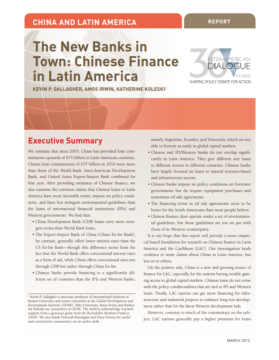The Politics Of Disaster Relief
After a 7.0 magnitude earthquake struck Haiti, the aftershock reached China in ways that few anticipated.The earthquake forced Chinese leaders to navigate the tricky politics of disaster relief.
As the rivalry between the United States and China escalates, The Banker's Silvia Pavoni spoke with the Director of the Dialogue's Asia & Latin America Program Margaret Myers regarding the implications of Sino-American competition in Latin America, China's strategy towards the region, and the Asian country's position on Venezuela.
"For many years China has been saying that it’s going to diversify its investment in Latin America, and indeed, it is starting to do so. Trade continues to rise. Investment has plateaued, but we’re seeing a real diversification into a wider variety of sectors. What used to be an interest almost entirely in commodities, such as soy, copper, and oil, is now spreading to a wider variety of industries, including tech and infrastructure development. This is not just major dams and rail, but also other forms of infrastructure development, for example ultra-high-voltage transmission lines. With that in mind, I think we’ll see potentially a greater contribution on the part of China to regional growth, depending on the type of the project and how it’s managed."
"Latin American countries and governments are in a very difficult position right now. They’re facing a lot of pressure by the United States government to not engage too extensively with China, especially in particularly sensitive sectors, which includes things like technology and telecommunications, and infrastructure projects and infrastructure finance. The United States views those projects as particularly problematic and as affecting overall U.S. influence in the region. That said, the reality is such that the region at this point and time depend rather significantly on China and in ways that are very different from its relationship with the United States. These are not ties that the U.S. is going to be able to break through discussions with regional governments and leaders in Latin America. What the U.S. can do at this point in time is to work with Latin American governments to try and ensure best outcomes by improving regulatory capacity, fighting corruption, and things of that nature to ensure that any contracts that are negotiated, whether with China or other actors, are carried out well."
"China has very clearly placed its bets on Maduro. It has indicated a strong preference for Maduro in international settings—support for that government—simply because it’s aiming to achieve stability in whatever form, and it sees stability at the moment as the status quo. At the same time, China understands that there’s tremendous prospect for change in Venezuela—inevitably, but it could take a long time—and there are back channels that China has developed with the opposition and others to understand what’s happening on the ground, to be able to develop some sort of plan B in the event of a transition."
After a 7.0 magnitude earthquake struck Haiti, the aftershock reached China in ways that few anticipated.The earthquake forced Chinese leaders to navigate the tricky politics of disaster relief.
Hugo Chavez, the Venezuelan president, has clearly been enticed by the Libyan drama, where his longtime friend and ally, Muammar al-Qaddafi, is under siege from rebel forces.
Estimates of the volume, composition, and characteristics of Chinese lending to the region since 2005.
 The Banker
The Banker
